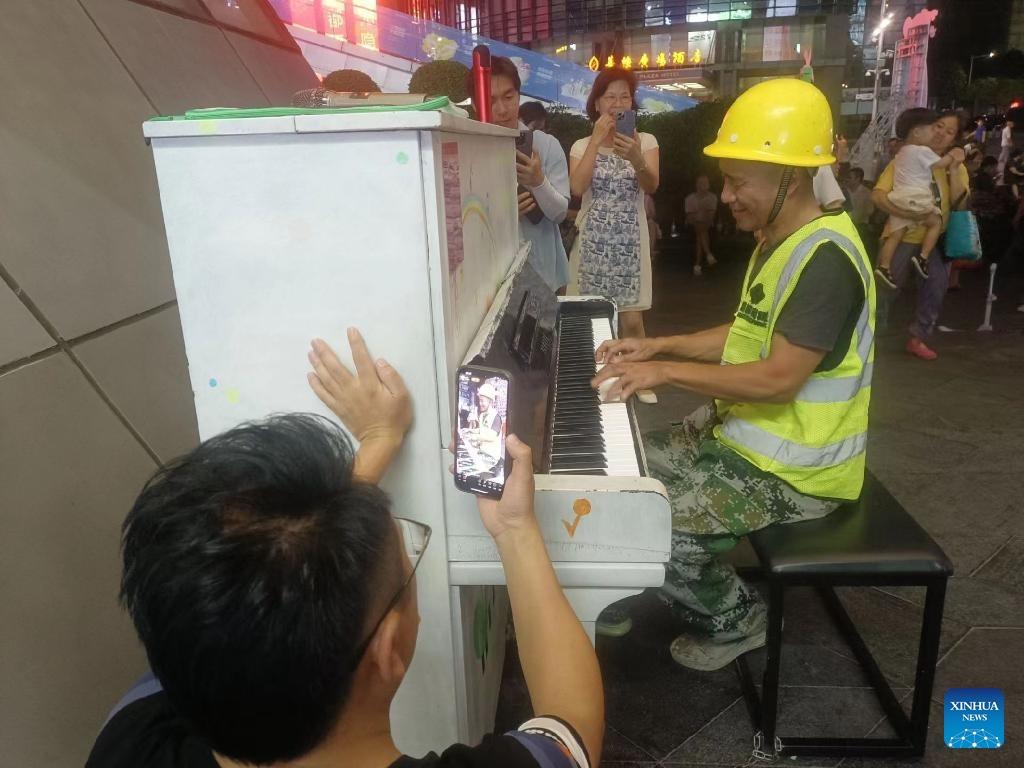 This undated file photo shows Yi Qunlin playing the piano on a pedestrian street in Huaqiangbei, one of the world's largest electronics markets in Shenzhen, south China's Guangdong Province. (PHOTO / XINHUA)
This undated file photo shows Yi Qunlin playing the piano on a pedestrian street in Huaqiangbei, one of the world's largest electronics markets in Shenzhen, south China's Guangdong Province. (PHOTO / XINHUA)
SHENZHEN — Kitted out in an orange reflective safety vest and a pair of camouflage pants, a construction worker was tinkling gracefully with the piano keys on a pedestrian street in Huaqiangbei, one of the world's largest electronics markets in the southern Chinese metropolis of Shenzhen, Guangdong province.
Still with his yellow hard hat on, Yi Qunlin, a 57-year-old migrant worker from Central China's Hunan province, was an unusual piano player. Crowds soon surrounded him, filming his beautiful rendition, and his video soon became a top trending topic on the Twitter-like platform Sina Weibo in mid-April.
Many Chinese netizens were touched by the video, leaving behind comments like "His hands can build high-rises. As also play splendid melodies!"
Since 2018, eight pianos have been placed on an over 900-meter-long pedestrian street near subway exits and squares in Huaqiangbei, free for any passer-by to play. Music lovers have nicknamed the municipal government's piano program "Huaqiangbei public piano".
It was inspired by British artist Luke Jerram, who has placed more than 2,000 street pianos in over 70 cities around the globe since 2008 besides coining the slogan: "Play me, I'm yours."
Enabling the public to communicate and exchange their ideas through music, the street pianos in Huaqiangbei have also attracted grassroots musicians, including but not limited to senior citizens, nearby young doctors, as well as migrant workers like Yi.
For Yi, music is a teenage dream lying untouched for over three decades. When he was 6 years old, Yi, who hails from an obscure village in Huarong county of Hunan, learned about the Chinese traditional two-stringed instrument erhu from some urbanites lodging at his home.
When he grew up a little more, as a curious teenager, he saw a piano in his cousin's house in downtown Huarong for the very first time.
"My family was too poor to afford a piano for me. So I used to visit my cousin very often, though it took about an hour's bumpy ride over 20 kilometers away from my home — all for the opportunity to play the piano," Yi recalls.
During the nearly two decades of doing odd jobs in Shenzhen, Yi often worked in different kinds of factories, construction sites and kitchens during the daytime, while teaching himself to play musical instruments like the harmonica, flute and saxophone when off work.
The migrant worker has not played for nearly 30 years. Surprisingly, Yi can still remember details of a classic music score adapted from The Butterfly Lovers (Liang Zhu in Chinese).
"I discovered the street piano while wandering with my colleagues during a weekend," Yi says. "It has been a long time since my last piano practice. I was so excited, my heart kept pounding very hard even after I returned home."
During this year's May Day holiday, Yi was invited to perform at the Guangming Culture and Art Center in the city's Guangming district. Inside the center's concert hall, the construction of which Yi was once part of, he enjoyed playing more than a dozen pieces on the piano, with his colleagues from the construction site among the audience.
"Reveling in the music world, I gradually overcame my nervousness," Yi says, adding that he was glad he could play the piano onstage — something he had never dared to dream of.
The pianos on the street of Shenzhen are pure magic for some.
A senior citizen in his 70s takes the subway every day to come to Huaqiangbei just to run his fingers over the piano keyboards.
As they are free, he even teaches interested candidates how to play them.
"Anyone can play the piano here, remedying their childhood regret," says a migrant worker who comes to practice daily.


